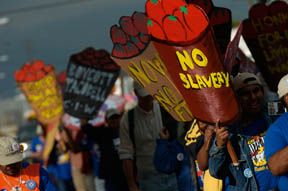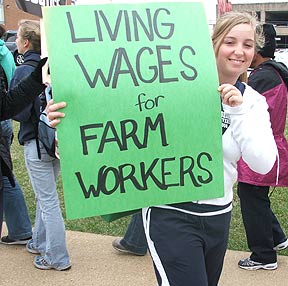“Two roads diverged…”
 Those are the famous first words of Robert Frost’s poem “The Road Not Taken.” The poem tells of a traveler faced with a choice between two roads. After some contemplation, he ultimately chooses the “one less traveled by.” His choice, the traveler tells us, “made all the difference.”
Those are the famous first words of Robert Frost’s poem “The Road Not Taken.” The poem tells of a traveler faced with a choice between two roads. After some contemplation, he ultimately chooses the “one less traveled by.” His choice, the traveler tells us, “made all the difference.”
Last week, the Florida Tomato Growers Exchange (FTGE), the powerful agribusiness lobby, announced its opposition to the CIW’s groundbreaking agreements with Yum Brands and McDonald’s to improve farm labor standards in Florida.
News of the FTGE’s opposition has left fast-food giant Burger King with a fateful choice. And in facing that choice, Burger King stands today, like Frost’s traveler, at a crossroads.
Down one road lies a future of unending exploitation, abuse, and poverty for Florida farmworkers. This is the road clearly marked by the FTGE in its announcement last week. It is a well-trodden road, one that Florida agriculture and its buyers have traveled for as long as anyone can remember.
But there is another road, a new road being hewed out of Florida’s fields by the CIW, Fair Food activists across the country, and two major buyers of Florida tomatoes who are wielding their purchasing power to demand fairer wages and working conditions for the workers who pick their tomatoes. Down this road lies a human rights transformation for the Florida tomato industry, a transformation unlike any that has been seen in recent history.
Burger King’s muscle would further the work of building this new road immeasurably, and so would speed the day of that transformation for all of Florida’s farmworkers. But, by every indication, Burger King has made its choice and is poised to follow the FTGE down the low road, the road toward endless exploitation.
It is not too late, however, to turn the fast-food leader around.
The Road toward Business as Usual
As some of you may have heard, the FTGE issued a press release last week making several claims: that the growers who supplied Yum Brands under the penny-per-pound deal will not do so this year, that the McDonald’s deal will not go into effect this season as scheduled, and that their members have nixed the program because of concerns over its legality.
Reggie Brown, the voice of the FTGE, was even quoted in the Chicago Tribune as saying, “Why would [growers] allow anyone other than their own management to set wage rates. It’s nuts. … I think there’s something a little bit un-American about that.”
With its announcement, the FTGE signaled that it is working not only to block further progress promised by the precedents established in the CIW’s agreements with Yum Brands and McDonald’s, but to aggressively roll back the changes in farmworker wages and working conditions that have already been achieved through those agreements.
It is important to pay close attention to the FTGE’s position here: They are saying that they don’t want to let their individual growers take extra money from their buyers if that money is going to go to the workers. This from an industry that regularly passes and enforces surcharges on all buyers of Florida tomatoes to cover rising costs for everything from chemicals to fuel. Apparently, in the FTGE’s view, it is “un-American” to accept a penny more per pound and pass it on to labor, but not to demand that same penny from your buyers so it can go to Exxon or Monsanto.
And, for the record, the “legal concerns” cited by the FTGE are totally baseless, as suggested by the fact that they have not been willing to make their so-called legal “analysis” available to anyone.
Rather, the legal posturing is nothing more than an effort to obscure the true reason for the lobby’s opposition, as declared by tomato industry leader Jay Taylor the first time they announced their refusal to participate, in May of this year: “I’m not going to be party to any agreement with a labor organization, negotiated without my involvement.” Make no mistake — the FTGE’s opposition is about control, not some new-found concern for the rule of law.
The true impact of this latest statement by the FTGE remains to be seen, as both Yum Brands and McDonald’s have reaffirmed their commitment to the agreements and have said they will see them through in their supply chains. But one thing is perfectly clear: The road that the FTGE would have Burger King choose is one that leads to only more misery and powerlessness for Florida farmworkers.
The Road toward Justice
 There is another road. This other road holds tremendous hope for progress — progress for Florida farmworkers, in the form of fair wages and humane working conditions, and progress for the industry as a whole, where a sustainable future is assured through contracts with the market’s largest buyers based on the fair treatment of its labor.
There is another road. This other road holds tremendous hope for progress — progress for Florida farmworkers, in the form of fair wages and humane working conditions, and progress for the industry as a whole, where a sustainable future is assured through contracts with the market’s largest buyers based on the fair treatment of its labor.
It is a future that moves away from the degenerative reliance on Florida’s competitive disadvantage – price, and by extension, ever lower wages – and focuses on what could be the state’s greatest advantage – the humane treatment of its workers.
This road is being carved out, step by step — agreement by agreement — by the CIW and the Campaign for Fair Food. And with each agreement, new ground is gained in support of these key principles:
- a penny more per pound for tomatoes to directly improve tomato pickers’ wages;
- a rigorous and enforceable Code of Conduct, developed in collaboration with the CIW, to ensure humane working conditions for farmworkers;
- a voice for farmworkers, who best know the abuses in the fields, in enforcing these improved wages and conditions.
But what, you might ask, about the strong words used by Reggie Brown and the FTGE in their press release? Aren’t those agreements with Yum Brands and McDonald’s now moot?
Brown did use some pretty strong words. But, in the end, they’re just that, words. According to the same Chicago Tribune article that quoted Mr. Brown: “McDonald’s is discussing the penny-per-pound deal with its suppliers and still plans on achieving its goals. (While) in a statement, Yum Brands said its agreement with the Florida tomato pickers still stands. ‘We think it’s the right thing to do.'”
Indeed, rather than the defiant declaration of a united industry, the recent announcement by the FTGE smacks more of a strong-arm attempt by the industry lobby to intimidate its members from continuing to pursue their individual interests by participating in the agreements, as Yum Brands suppliers have done for the past two years without a hitch.
Whither Burger King?
 As the FTGE struggles to pull it members away from the road to progress and back toward business as usual, where does Burger King stand? By all appearances, Burger King would rather throw its lot in with the FTGE than join with other fast-food leaders and use its influence to help carve out the next steps down the path toward greater justice.
As the FTGE struggles to pull it members away from the road to progress and back toward business as usual, where does Burger King stand? By all appearances, Burger King would rather throw its lot in with the FTGE than join with other fast-food leaders and use its influence to help carve out the next steps down the path toward greater justice.
Indeed, there are indications that Burger King is actively collaborating with the FTGE in this well-timed effort to undermine long-overdue progress. And there can be no doubt that Burger King will make the FTGE’s statement the centerpiece of its media outreach in the weeks leading up to the march on the 30th of this month. In fact, they already have.
Steven Grover, Burger King’s vice president for food safety, quality control, and regulatory compliance, used the argument in Burger King’s defense even before the latest announcement. “We’re such a small tomato buyer in that region we can’t make (the growers) cooperate more than anyone else,” Grover said. “They’ve sent us a letter saying they will not cooperate and they will not sell us tomatoes if we demand cooperation,” Ft. Myers Weekly (10/11/07). And just since the announcement on Monday, Grover has already begun eagerly forwarding coverage of the FTGE’s press release in response to customers who have contacted Burger King to demand that the company follow Yum and McDonald’s lead and address human rights violations in its supply chain.
Rather than use its leverage to work for progress, as Yum and McDonald’s are doing, Burger King instead has thus far chosen to feign impotence so as to absolve itself of any responsibility, waving the FTGE’s statement like a white flag of surrender.
What is to be done?
It is confounding that the FTGE remains so doggedly determined to fight progress for the workers who harvest its members tomatoes, given that the produce industry, by its own admission, is facing a new reality – the rise of the socially responsible consumer.
 Consider this, from a recent article in the produce industry journal, The Packer (10/3/07):
Consider this, from a recent article in the produce industry journal, The Packer (10/3/07):
“Consumers believe the degree of social responsibility a produce company exhibits is a highly important factor when they’re making their purchase decisions, according to new research from the Produce Marketing Association. In a survey of 1,000 consumers this summer, 55% percent placed the highest degree of importance on the social responsibility – or sustainability – of their produce suppliers. Survey participants placed organics (13%), distance from farm to store (11%) and fair living wages (11%) at the top of the list of social responsibility issues.”
It is one thing for produce industry leaders to ignore the preferences of their consumers. Tomato growers do not put resources into branding their product. That’s because tomato growers generally don’t sell directly to the public, but rather to retail food companies, like Burger King, that in turn brand and sell their products to consumers.
For Burger King to ignore the growing call for social responsibility, however, is something altogether different. Burger King spends hundreds of millions of dollars on marketing every year and cannot afford to allow its brand to be tarnished by the antiquated labor practices of its suppliers.
Now, more than ever, it is critical that Fair Food activists increase the pressure on Burger King and not allow the fast-food giant to seek shelter behind the FTGE’s opposition to progress as a justification for its own inaction.
Now, more than ever, it is time for Burger King to step up, stop stalling, and stand behind the principles established in the Yum Brands and McDonald’s agreements.
Burger King has a choice to make. Apparently, left to its own devices, Burger King would choose the path of least resistance, the road toward business as usual and continued exploitation.
It is up to us to help Burger King make the right choice. It is up to us to put Burger King, once and for all, on the high road, the road toward justice.
Join us in Miami this November 30th for the March on Burger King. Your presence that day could “make all the difference.”
